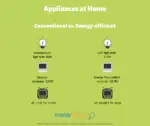
Appliances such as toasters and hair dryers are known for being villains to your energy bills due to their high wattages. But do you know how much you spend on them every month? Or, if you take a look around your home, can you tell the electricity usage of any of your appliances? If the answer is no, then it’s time to calculate the energy cost of your appliances at home.
How can I determine how much energy my appliances are using?
“How much does an appliance cost to run?” Although that’s the million-dollar question, it can be easier than you think to calculate the energy cost of your appliances. All you need to do is apply your data to a specific formula. The equation is used by many energy providers and official organizations to create those online kilowatt-hour (kWh) cost calculators. This cost of electricity formula can calculate energy costs based on the watts (wattage) info that comes with every appliance.
Before you find out what appliances take the most electricity, you need to know the main information required to calculate your electricity consumption manually:
- The appliance’s wattage
- The hours you spend using it daily
- The energy rates charged by your electricity provider
How do I calculate kWh for appliances?
In order to calculate kWh from watts, you will need to find out your appliance’s wattage. Most appliances come with stickers that show such details (if you can’t find it, the information will probably be in the user manual). As a last resort, you can do a quick search on the internet, or even call the appliance’s manufacturer and ask for information.
As an example, let’s say you want to find out the kWh of a TV that you use for five hours a day — and you already know the wattage, which is 138 watts. The estimate daily kWh for the TV can be found through the formula below.
Daily Kilowatt-hours (kWh)
(Wattage x Hours used daily) ÷ 1,000 = kWh per day
For the TV example:
(138 watts x 5 hours) ÷ 1,000 = 0.69 kWh per day

How do I calculate kWh cost?
Now that you know how to calculate your kWh, you are one step closer to finding out the energy cost of your appliances. All you need to do is check the energy rates for your home. Generally, electricity prices change depending on the location and the power provider. That’s why you need to know precisely how much do you pay for each KWh.
How much is a kWh of electricity?
If you check your most recent electricity bill, there will probably be some information on the cost of energy per kWh. Also, most energy retailers provide their rates on their websites, so it won’t be a hard task for you to figure it out.
Your appliance energy costs will then depend on three things: Utility rates, each device’s wattage, and the amount of time you use them.
Calculating the daily costs of an appliance
The estimated energy costs of appliances are the result of your kWh multiplied by the number of hours you use the device per day.
Daily costs = kWh x Electricity rate
Taking into consideration the TV from the previous example — which consumes 0.69 kWh per day — let’s say the rates are 6 cents per kWh.
The daily energy costs for that TV would be of:
Daily costs: 0.69 kWh x 6 cents = 4.14 cents
To calculate the annual costs, you would only need to multiply the daily costs by 365.
Annual costs: 4.14 cents x 365 = 1,474.6 cents, or $14.74
Other examples
Do you need more examples? We’ve got your back! Here are two more examples of how you can calculate the cost of an appliance based on two frequent questions.
How much does it cost to run a 1,500-watt heater for 24 hours?
Heaters are one of the main reasons why energy bills can go higher during winter. No wonder many heater owners are always asking themselves how much they spend monthly on electric heaters.
If you want to calculate your heating costs, you can apply the formula above or get a hint with the following example.
Let’s say a 1,500-watt heater is on for 24 hours under energy rates of 8 cents. How much would it cost for a month?
First, we need to find out the kWh of such a heater:
(1,500 watts x 24 hours a day) ÷ 1,000 = 36 kWh per day
Now we can calculate daily and monthly costs considering the 8 cents rate:
Daily Costs: 36 kWh x 8 cents = 288 cents, or $2.88
Monthly costs: $2.88 x 31 = $89.28
In this scenario, the electric heater would cost you around $89.28 per month.
How much does it cost to run a hot tub in Canada?
Canada energy rates vary significantly from one province to another, so let’s imagine two scenarios:
The energy cost of a hot tub in Alberta for one hour
An average hot tub will consume around 4,000 watts while in use. As of 2019, electricity rates in Alberta were capped at 6.8 cents. Considering the appliance is used for an hour daily, we can quickly estimate its costs.
(4,000 watts x 1 hour a day) ÷ 1,000 = 4 kWh per day
Daily costs: 4 kWh x 6.8 cents = 27.2 cents for an hour a day
The energy cost of a hot tub in Ontario for one hour
An average hot tub will consume around 4,000 watts while in use. In Ontario, mid-peak rates are around 9.4 cents per kWh, so the costs of running a hot tub for one hour can be higher than in Alberta, especially during mid and on-peak seasons.
(4,000 watts x 1 hour day) ÷ 1,000 = 4 kWh per day
Daily costs: 4 kWh x 9.4 cents = 37.6 cents for an hour a day
The average appliance costs for residential use in Canada
Although formulas are useful resources, it’s not exactly practical to calculate the energy usage for the whole household manually. In this case, the best way to start is finding out what appliances cost people the most money on average, and then you can apply the formula to your highest-consuming devices.
According to Natural Resources Canada (NRCan), fridges, freezers, dishwashers and water coolers account for up to 14 percent of the energy spent in Canadian households. The distribution of residential energy use in Canada is highly related to the cold climate, which explains why heating accounts for more than 60 percent of the average Canadian energy bill. Read a detailed breakdown of the energy costs in Canada as reported by NRCan in 2016.
- Space heating: 61%
- Water heating: 19%
- Appliances: 14%
- Lighting: 4%
- Space cooling: 3%
If you want to know more about it, BC Hydro provides users with the average wattages for many appliances at home in Canada. According to the provider’s website, the kWh costs of appliances can change significantly from conventional devices to energy-efficient models.

How to spend less on energy bills?
Whether electricity or natural gas, reviewing your energy choices is always something significant to your budget. Once you calculate your usage per appliance, you can start planning how to reduce your usage or switching them out for energy-efficient products. Most appliances and electronic devices will have energy-efficient versions. According to NRCan, an appliance’s long-term energy costs are as important to your finances as prices at the time of purchase.
If you want to do more than just estimate appliance costs, consider purchasing an energy usage monitor. These devices let you track your consumption very easily, and they won’t cost you that much money. Energy use monitors will allow you to have an accurate look at your consumption, which will let you know where you should start replacing appliances.
In case you already checked your energy consumption, but still wants to reduce your energy bills, it’s time to review your energy choices. This means you should compare rates and find better electricity and natural gas rates. EnergyRates.ca is an unbiased comparison tool for residential, small business, commercial and industrial consumers. The website allows you to fill in your postal code to compare the available rates in your area, so you can find the best plan for your energy needs.
What is a kilowatt-hour?
A kilowatt itself is a unit of electrical power that is equal to 1000 watts. A kilowatt-hour refers to the number of kilowatts used per hour. Your energy provider typically bills you based on the number of kilowatt-hours your household or business has used during a particular month.
Why should I care?
Calculating the energy cost of your various different appliances can help you pinpoint where there is inefficient energy use in your home and business – from there, you can replace old appliances or upgrade them to more energy-efficient models. As such, you’ll be able to cut down your monthly energy costs and be able to put those savings toward anything you find important.











